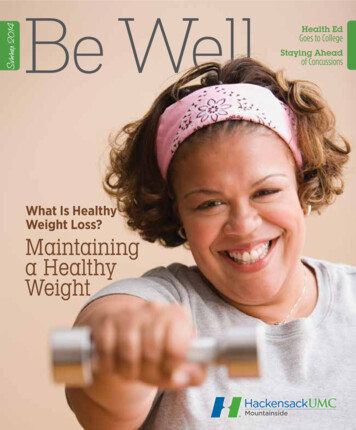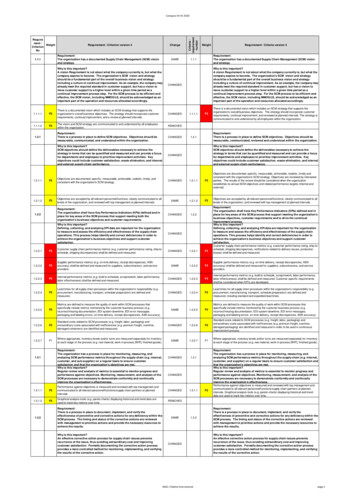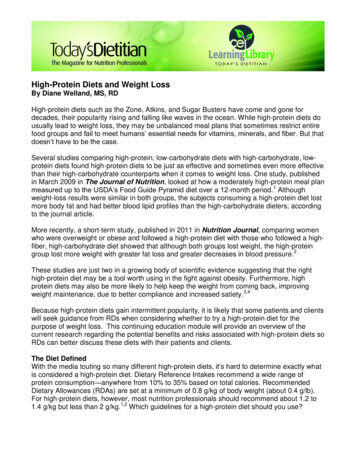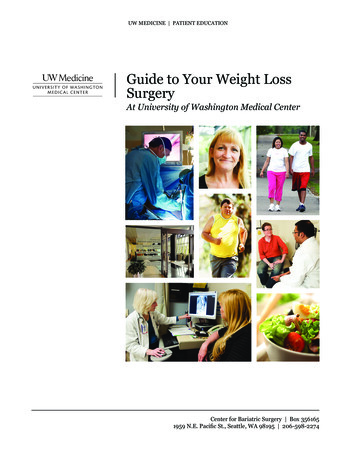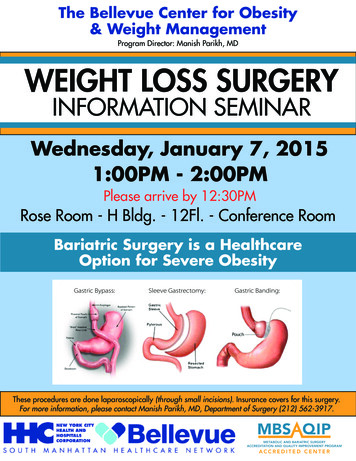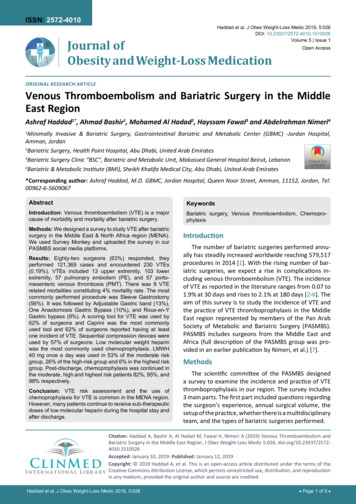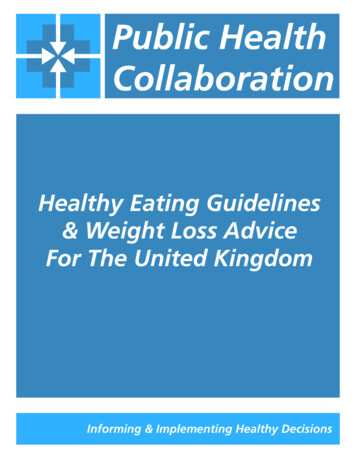
Transcription
Public HealthCollaborationHealthy Eating Guidelines& Weight Loss AdviceFor The United KingdomInforming & Implementing Healthy Decisions
ContentsWelcome.Page 3Advisory Board Members.Page 4Introduction.Page 7Healthy Eating Guidelines.Page 8The Real Food Lifestyle.Page 16Weight Loss Advice.Page 24The Real Food Lifestyle For Weight Loss.Page 27Closing Remarks.Page 31Patrons.Page 32References.Page 36
WelcomeThe Public Health Collaboration (PHC) is a non-profit organisation that is dedicated toinforming and implementing healthy decisions, and it is with pride that I'm able tointroduce you to this report on healthy eating guidelines and weight loss advice for theUnited Kingdom.This report clearly and concisely provides an insight into the decades of work andexperience that our founding members and advisory board have accumulated fromworking with thousands of patients to improve their health. It is with deep gratitude thatI thank all of them from the bottom of my heart for all their hard work and willingness togo above and beyond to bring this report to life.A special thanks also goes to our patrons and members without whose support thisreport and the PHC itself would not be possible. If you wish to find out more about thePHC please visit our website at www.PHCuk.org where you can also consider a donationto our cause.This report allows us to inform healthy decisions but our mission also includesimplementing healthy decisions. Many of our founding members are advising therecommendations contained in this report to their patients through what we call realfood clinics. If you are a health professional wanting to use our recommendations then Iencourage you to get in touch with us via our website so that we can aid you inimplementing healthy decisions for your patients.Finally, the aim of this report is not simply to raise our concerns with current governmentrecommendations for healthy eating and weight loss but also to provide practicalscientific solutions that help us all obtain and maintain healthy lifestyles and dramaticallyimprove public health.With the best of wishes,Samuel FelthamDirector of the Public Health Collaboration3
Advisory Board MembersDr. Trudi Deakin – DietitianTrudi is Chief Executive of the registered charity X-PERT mplementation and audit of structured education for thepublic and healthcare professionals. Trudi’s first degree in1993 was Nutrition and Dietetics, followed by a teachingqualification in 1998 and a doctorate in diabetes in 2004.Dr. Aseem Malhotra – CardiologistWhen he is not working as a doctor in the National HealthService, Aseem Malhotra reigns supreme in his fight to raiseawareness about the health benefits of a sugar-free diet,maintaining that sugar deserves its reputation as "PublicHealth Enemy Number 1". His no-holds-barred approach tochallenging common health beliefs is proving highly effectivein getting medical professionals and social authorities fromaround the world to sit up and take notice.Dr. Tamsin Lewis – PsychiatristDr. Tamsin Lewis is a one of the top ranked Ironman 70.3athletes in the world and races as a professional triathlete.Tamsin studied Medicine & Surgery at Kings College Londonand also has a Bachelor of Science degree in NeuroScienceand Anatomy. Post graduation she worked as hospital doctorin Medicine and Anaesthetics for two years before pursuing apost-graduate Royal College of Psychiatrists qualification.Dr. Rangan Chatterjee – General PractitionerDr. Chatterjee works as an NHS GP in Oldham where he looksafter deprived and socially isolated patients. He has a specificinterest in trying to treat people without necessarily resortingto drugs and tries to get the message out that significant,non-medicinal lifestyle changes can dramatically improve yourhealth. Recently he has featured in the BBC One programme"Doctor in the House" where he helped families improve theirhealth through real food and smart exercise.4
Dr. Jen Unwin – Clinical PsychologistDr. Jen Unwin has worked in the NHS for nearly 30 years andover this time has been interested in how it is that people cancope and even thrive with long-term health challenges. Shebelieves that patients who are able to maintain theirhopefulness and emotional well-being in the face of illnesshave better quality of life, experience fewer symptoms, takeless medication, consult less and even live longer. Dr. Unwin isthe chair of the UK Association for Solution Focused Practice.Dr. Ayan Panja – General PractitionerA career GP, Dr. Panja has been a doctor for 17 years havingqualified from the Imperial College School of Medicine. He is apartner in a busy city centre NHS surgery and is interested inthe prevention of illness and disease. He also presents HealthCheck, a round up of global health stories on BBC News andBBC World News and is a clinical assurance adviser for NHSChoices. His passion is to improve people's understanding ofhealth face to face or via media.Dr. Katharine Morrison – General PractitionerDr. Morrison is a senior practising GP and a senior partner in amedical practice in Ayrshire. Her son was diagnosed with type1 diabetes 10 years ago, and since then she has workedextensively with people living with both type 1 and type 2diabetes for 12 years. She is also the co-author of twoimportant papers explaining the improvements in metabolicresults, weight and glycaemic control for low carbohydratediets in metabolic syndrome and diabetes.Dr. David Unwin – General PractitionerA GP based in Southport, Dr. Unwin is the RCGP NationalChampion for Collaborative Care and Support Planning inObesity & Diabetes, as well as a Clinical Expert in diabetes. In2016 he won the NHS Innovator of the Year Award. He haspublished his work in Practical Diabetes, Diabesity in Practiceand in the BMJ.5
Dr. Joanne McCormack – General PractitionerDr. McCormack has been a GP for 24 years and was a GPpartner in Warrington up until April 2015. She was also a GPTrainer, and now works as a sessional GP in two trainingpractices as well as the Named GP for Safeguarding Childrenfor an area of 300,000 people. Over the past 30 years that shehas been a doctor she has seen the incidence of diabetes goup five fold in her town, something that has been echoednationally.Dr. Kailash Chand OBE – General PractitionerDr. Chand OBE is the first Asian deputy chair of the BMA and isalso, Chair of Health watch Tameside and formerly PCT Chairof Tameside and Glossop, after working as a GP since 1983. Hehas been a BMA activist and NHS, and public healthcampaigner for the last two decades and has served onvarious BMA committees including: General Medical Councilworking group (2006 to present),General PractitionersCommittee (1999 to 2009),Vice chair: Equal OpportunitiesCommittee (2007 to 2009).Dr. Ian Lake – General PractitionerA GP in Cheltenham, Dr. Lake has had a long term interest inpreventive medicine. After seeing the lack of dietary advice inthe NHS he set up a weight management research project inprimary care. It produced results comparable with all of thebest current commercial providers, and won the GP AwardsClinical Team of the Year, Nutrition award in 2012. Dr. Lakewas also involved in getting cycling on prescriptioncommissioned in his local area.6
IntroductionThe first set of official healthy eating dietary guidelines for the United Kingdom of GreatBritain and Northern Ireland (UK) were published by the Food Standards Agency (FSA) in1994, called The Balance of Good Health [1]. In 2007 these guidelines were revised and relaunched by Public Health England (PHE) as the eatwell plate [2]. Finally, in March 2016the latest set of dietary guidelines were published by PHE called The Eatwell Guide [3].The UK has one of the highest prevalence's of obesity in Europe at 25% and the numberof people living with type 2 diabetes has more than doubled since 1996 [4] [5]. Both costthe NHS 16 billion a year, and the UK economy at large 47 billion a year [6]. Theseworrying statistics suggest that there is something wrong with the lifestyles of the UKpopulation.However, according to the latest National Diet and Nutrition Survey published in 2014 byPHE and the FSA adults in the UK have been generally following healthy eatingguidelines. In fact on average adults in the UK have been eating 383 calories below therecommended daily amount as well as eating just below the recommended 35% for totalfat consumption [7]. This seemingly paradoxical situation of following healthy eatingguidelines yet having dire health statistics brings into question the very guidelines thatthe UK population is being asked to follow.Weight loss advice in the UK from the National Health Service (NHS) is currently basedon guidelines from the National Institute for Health and Care Excellence (NICE) [8]. Thesestate that“Diets that have a 600 kcal/day deficit (that is, they contain 600 kcal less thanthe person needs to stay the same weight) or that reduce calories by lowering the fatcontent (low-fat diets), in combination with expert support and intensive follow-up, arerecommended for sustainable weight loss.” These guidelines were set in 2006 and havenot been fully updated since then, despite increasing evidence from multiple analyses ofrandomised controlled trials, the most reliable form of nutrition science, that otherdietary interventions are more effective for both weight loss and overall health.In this report, the Public Health Collaboration will set out its concerns with currenthealthy eating guidelines and weight loss advice for the UK and provide newsolutions based on the most up to date scientific evidence.7
Healthy Eating GuidelinesHealthy eating guidelines for the UK are currently encapsulated by The Eatwell Guide,which is summarised as follows:1. Eat at least 5 portions of a variety of fruit and vegetables every day2. Base meals on potatoes, bread, rice, pasta or other starchy carbohydrates;choosing wholegrain versions where possible3. Have some dairy or dairy alternatives (such as soya drinks); choosing lower fat andlower sugar options4. Eat some beans, pulses, fish, eggs, meat and other proteins (including 2 portions offish every week, one of which should be oily)5. Choose unsaturated oils and spreads and eat in small amounts6. Drink 6-8 cups/glasses of fluid a day7. If consuming foods and drinks high in fat, salt or sugar have these less often and insmall amounts.Alongside these seven points in The Eatwell Guide booklet readers are advised that fruitjuice or smoothies should be limited to no more than 150ml per day. Yet in anothersection readers are told that these drinks count as one portion of fruit, even though theyare known to be a major contributor to obesity and type 2 diabetes [9]. When thesehealthy eating guidelines are followed it is likely that every meal will contain foods with ahigh glycaemic index as well as having an overall high glycaemic load. Again, both ofwhich are known to be major contributors to the development of obesity and type 2diabetes [10]. There is also an increasing amount of evidence that the highly processed oilsand spreads recommended by The Eatwell Guide might not be safer alternatives tonatural fats such as butter or ghee, and may have the potential to cause serious harm tothe public's health [11] [12].The latest National Diet and Nutrition Survey published in 2014 suggests that the UKpopulation are generally following current healthy eating guidelines [7]. On average, totalenergy consumption is 383 calories below the recommended daily amount, total fatconsumption is just below the recommended 35%, fruit and vegetable portions are at 4 aday instead of the recommended 5 and lastly adults in the UK eat 71g of red meat a day,which is only 1g over the recommended 70g a day. The two areas of food consumptionthat this survey suggests that the UK population eats in excess of recommendedamounts are free sugars and saturated fat. However, these slight excesses ofapproximately 1.5% each are based on current recommendations that do not entirelyreflect the most up to date scientific evidence.8
Arguably, the advice to follow current healthy eating guidelines has resulted in 25% ofadults being obese, the prevalence of type 2 diabetes doubling in 20 years, 35% livingwith pre-diabetes and 20% living with the early-stages of non-alcoholic fatty liver disease[13] [14].The UK population's current state of ill-health is also having a significant impact on theeconomy through rising costs to the NHS. It is projected that the cost of obesity to theNHS will double to 12 billion a year by 2030 with type 2 diabetes already costing theNHS 10 billion a year [6]. This is in addition to the hidden economic costs resulting fromill-health and the inability to work as a result of these conditions, which currently coststhe UK economy 47 billion a year. At a time when saving money in the NHS isparamount to its survival, it is critical that we consider all possible solutions to save bothhealthcare costs and the nation's health, especially when current approaches appear tobe failing at both aims.With all of this in mind the Public Health Collaboration has three main areas ofconcern in regard to The Eatwell Guide:1. The avoidance of foods because of saturated fat content.2. The dietary reference value of no more than 35% total fat.3. The quality and quantity of carbohydrates.9
- Co
2 Eggs 0 0 2 Slices of Bacon 0 0 Tomatoes (100g) 0.54 3.6 Coffee (160ml) with whole milk (30ml) 0.4 4.7. TOTAL 0.94 N/A. Evidently a breakfast recommended by The Eatwell Guide in comparison to a PHC recommended breakfast has foods with much higher carbohydrate-densities alongside a total glycaemic load 46 times higher.
